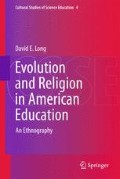Abstract
Returning to student experiences, Chap. 7 details a thematic analysis of student social perspectives and educational histories regarding evolution. Working us toward a richer description of what the normative case of American evolution education might look like, I present both a muted but also tension-filled picture, along with some odd extremes. Students describe educational histories where more than half recall evolution being omitted, or discussed in one class or less during the entirety of their K-12 education. When it was discussed, students recall teachers specially qualifying the topic as something only to be learned for the state test, with some schools sending permission slips home before the evolution lesson. Creationist students describe their experience at feeling “closeted,” in that they feel they cannot discuss their actual thoughts regarding evolution. Non-Creationist students discuss the impact of what they describe as “very religious people,” those they feel have issue with evolution in the curriculum.
From this, I connect the discourse of campus outreach to the politics within schools. Student’s histories are illustrated by sharing the views about evolution held by going back to their communities and interviewing their past science teachers. Reading across teacher experiences, in some cases current evolution educational practices are at best barely getting the job done, and at worst likely in violation of established law. Additionally, I explore the evangelical Christian homeschooling movement in an interview with one student’s past homeschool science teacher. In summary comment, from demographic information collected from students, teachers, and college faculty, the relationship between receptivity toward evolution and political affiliation is discussed.
Access this chapter
Tax calculation will be finalised at checkout
Purchases are for personal use only
References
Bloom, H. (1992). The American religion: The emergence of the post-Christian nation. New York: Simon & Schuster.
Dawkins, R. (2006). The God delusion. Boston: Houghton Mifflin.
Dennett, D. C. (2006). Breaking the spell: Religion as a natural phenomenon. New York: Viking.
Edgell, P., Gerteis, J., & Hartmann, D. (2006). Atheists as “other”: Moral boundaries and cultural membership in American society. American Sociological Review, 71(2), 211–234.
Fish, S. (2005). Briefings – academic cross dressing. How intelligent design gets its arguments from the left. Harper’s. 70.
Harris, S. (2006). Letter to a Christian nation. New York: Knopf.
Hitchens, C. (2007). God is not great: How religion poisons everything. New York: Twelve.
Mooney, C. (2005). The Republican war on science. New York: Basic Books.
Morris, H. M. (1974). Scientific creationism. San Diego: Creation-Life.
North, J. B. (1994). Union in truth: An interpretive history of the Restoration movement. Cincinnati: Standard Pub.
Pew Forum on Religion & Public Life. (2010). US religious knowledge survey. Washington, DC: Pew Forum on Religion & Public Life.
Pew Foundation (2008). U.S. religious landscape survey. Retrieved from: http://religions.pewforum.org/pdf/report-religious-landscape-study-full.pdf
Roman Catholic Church (1996). Magisterium is concerned with question of evolution for it involves conception of man. Pope John Paul II. Message to Pontifical Academy of Sciences, October 22, 1996.
Toumey, C. P. (1994). God’s own scientists: Creationists in a secular world. New Brunswick: Rutgers University Press.
Wile, J. D. (2000). Exploring creation with biology. Michigan: Apologia Educational Ministries.
Wuthnow, R. (2005). America and the challenges of religious diversity. Princeton: Princeton University Press.
Wuthnow, R. (2009). No contradictions here: Science religion and the culture or all reasonable possibilities. In H. W. Attridge & R. L. Numbers (Eds.), The religion and science debate: Why does it continue? New Haven: Yale University Press.
Author information
Authors and Affiliations
Corresponding author
Rights and permissions
Copyright information
© 2011 Springer Science+Business Media B.V.
About this chapter
Cite this chapter
Long, D.E. (2011). Evolution Education from Campus to Home. In: Evolution and Religion in American Education. Cultural Studies of Science Education, vol 4. Springer, Dordrecht. https://doi.org/10.1007/978-94-007-1808-1_7
Download citation
DOI: https://doi.org/10.1007/978-94-007-1808-1_7
Published:
Publisher Name: Springer, Dordrecht
Print ISBN: 978-94-007-1807-4
Online ISBN: 978-94-007-1808-1
eBook Packages: Humanities, Social Sciences and LawEducation (R0)

